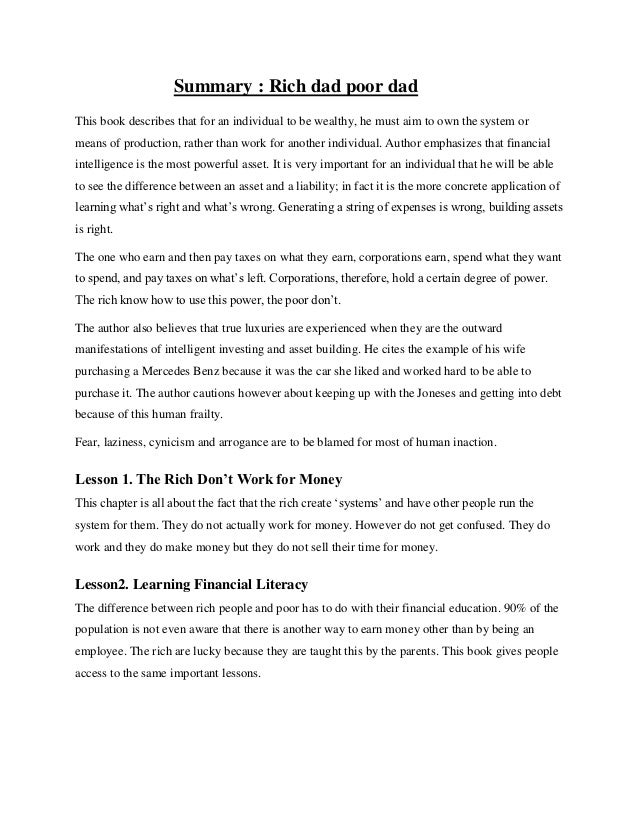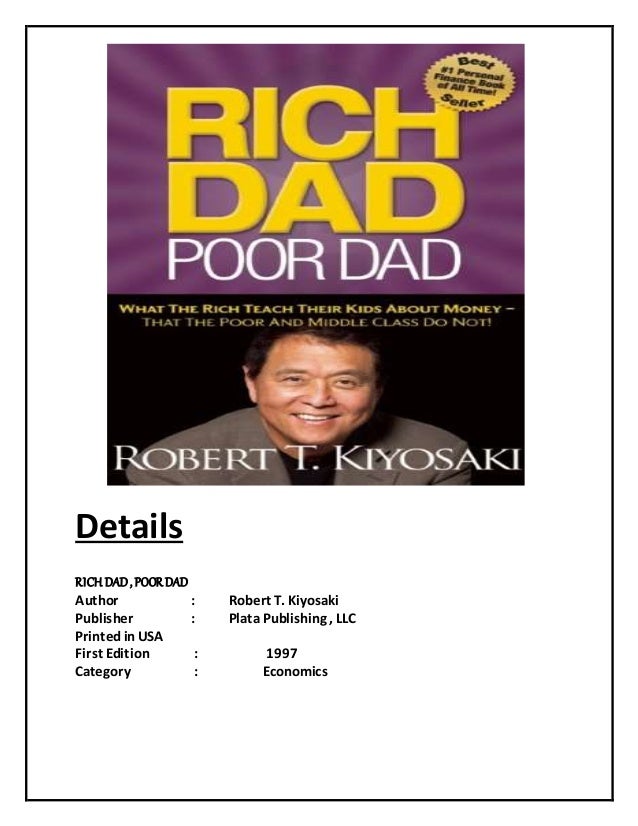Rich Dad Poor Dad Summary

Rich Dad Poor Dad Summary- Lessons by Robert Kiyosaki. The house is taking money out of your pocket. However, if you own a house and it brings thousands of rupees a month by renting it, then it is an asset. The house is putting money in your pocket. The RICH Dad taught Robert Kiyosaki to always invest in assets.

1-Sentence-Summary: tells the story of a boy with two fathers, one rich, one poor, to help you develop the mindset and financial knowledge you need to build a life of wealth and freedom.Read in: 4 minutesFavorite quote from the author:is a modern classic of personal finance. Although controversial and often heavily criticized, people have decided it’s worth reading – otherwise it wouldn’t have sold.tells the story of his two Dad’s in his childhood. His own father and the father of his best friend. While he loved both, they were very different when it came to dealing with finances.The summary on Blinkist starts with the idea that many of us are too afraid of being branded as a weirdo, in order to exit the. We let the two main emotions everyone has around money dominate our decisions: fear and greed. That’s why we still stick to the outdated mantra “Go to school, go to college, get a job, play it safe.” when in reality.For example, when you get a raise at your job, a wise choice would be to invest the extra money in something that builds wealth like stocks or bonds, which has medium to high risk, but also a very high reward. Maybe you find a good fund with a 60% chance to double your money within a year, but a 40% chance of losing it all. However, most likely your fear of losing the money altogether will keep you from doing so.But when your greed takes over, you might then spend the extra money on an improved lifestyle, like buying a car, and the payments eat up the money – this way you’re guaranteed to lose 100%.
This already gives you a glimpse of how important it is to educate yourself financially. Since we receive no financial education in school or college, sadly, this is entirely up to you.Look around and you’ll see plenty of financially ignorant people in your own life. Just take a look at local politicians. Is their city in debt? Your mayor might be a great mayor, but unfortunately, no one ever taught him how to deal with money. If you want to save this summary for later, download the free PDF and read it whenever you want.For the same reason. The only way for you to counteract this is to start now. Today is the youngest you’ll ever be, so take a close look at what you can and can’t afford.
This way you’ll be able to set realistic financial goals, even if it means waiting a few more years for that shiny new BMW.Next, adopt the mindset of “work to learn” instead of “work to earn”. Take a job in a field you have no clue about, such as sales, customer service or communications, to develop new skills –. Set aside 5% of your income each month to buy books, courses and attend seminars on personal finance to start building your financial IQ.The first step towards building wealth lies in the mindset of managing risks, instead of avoiding them and learning about investments will teach you that it’s better to not play it safe, because that always means missing out on big potential rewards. Don’t start big, just set aside a small amount, like $1,000 or even $100, and invest it in stocks, bonds, or even. Treat the money as if it’s gone forever and you’ll worry less about losing it.As soon as you start your journey towards wealth, you’ll realize that it’ll be quite a long one. That’s why it’s important to stay motivated. Kiyosaki suggests creating an “I want” and an “I don’t want” list, with items like: “I want to retire at age 50.” or “I don’t want to end up like my broke uncle.”Another idea is to pay yourself first each month. Take the portion of your salary you want to spend on stocks or your financial education, invest it and pay your bills afterwards.
It’ll create pressure to be creative in making money and show you what you can afford.Use your money to acquire assets instead of liabilities. Assets are stocks, bonds, real estate that you rent out, royalties (for example ) and anything that generates money and increases in value over time. Liabilities can be cars or electronics with maintenance costs and monthly payments, a house with a mortgage, and of course debt – basically anything that takes money out of your pocket each month.There’s no rush. Just stay at your full time job and “mind your own business”. In this case, your job is what pays the bills and your business is what makes you wealthy. Build your business on the side and use it to invest in assets until your assets eventually become the main source of your income. You can even file a corporation to be taxed only after you’ve earned and invested, instead of being taxed before investing as an employee and trying to live off what’s left.The most important thing is that you start today. You are your own biggest asset, so the first thing you should put some money into is yourself.

Rich Dad Poor Dad ReviewI read the book a year ago and I loved it. I felt a little heartbroken when I found out that and that there’s so much criticism around Robert and the book. However, that doesn’t make it less of a good story or advice.Unfortunately, the story of his two Dads is what makes the book great – and it’s completely missing in this summary on Blinkist. While the financial advice is sound in the summary, it’s not nearly as powerful as it is when you get it wrapped in the book’s story.The book isn’t too long either, and the initial story is mostly covered in the first 50 pages, so I highly recommend you and read it yourself. It costs less than $10, which, I think, makes it a great investment. And isn’t that what you came here for?
Rich Dad Poor Dad Summary Chapter 1
Who would I recommend the Rich Dad Poor Dad summary to?The 9 year old who just got her first allowance, the 42 year old who’s worried about her job being secure and anyone who doesn’t know what the definition of an asset is.Post navigation.
Find more information about:ISBN: 554X 540OCLC Number:6554112Description:xii, 270 pages; 22 cmContents:On popular justice: a discussion with Maoists -Prison talk -Body/Power -Questions on geography -Two lectures -Truth and power -Power and strategies -The eye of power -The politics of health in the eighteenth century -The history of sexuality -The confession of the flesh.Other Titles:Works.Responsibility:Michel Foucault; edited by Colin Gordon; translated by Colin Gordon and others.More information:.Abstract. These pieces, ranging over the entire spectrum of his concerns, enabled Foucault, in his most intimate and accessible voice, to interpret the conclusions of his research in each area and to demonstrate the contribution of each to the magnificent - and terrifying - portrait of society that he was patiently compiling. 'Michel Foucault has become famous for a series of books that have permanently altered our understanding of many institutions of Western society. Michel foucault power knowledge pdf. He analyzed mental institutions in the remarkable Madness and Civilization; hospitals in The Birth of the Clinic; prisons in Discipline and Punish; and schools and families in The History of Sexuality.